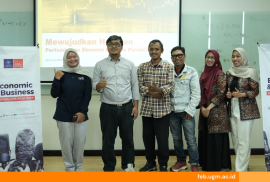The circular economy is a trend and a necessity of our time. Paola Cortese Notoboyo, CEO of Cortese Notoboyo Circular Ecosystem, emphasizes that every small step towards a zero-waste lifestyle can have a significant impact.
In the FEB Talks podcast, Steps Towards a Sustainable Future, Paola shares her inspiring journey of how adopting a zero-waste lifestyle and embracing the circular economy can become tangible steps towards sustainability.
Paola’s interest in plastic recycling was sparked by a video of a girl who managed to store her household waste in a single jar for a year. Inspired, Paola adopted a similar lifestyle, starting with small changes at home by sorting, reducing, and managing her household waste. These small actions led to a significant impact—eventually, she reduced her household waste to just one jar per year.
“I focused on what I could control: what I bought, used, and threw away. After two years of experimenting, I reduced my household waste to just one jar a year,” she recalls.
This realization convinced her that individuals could create meaningful change with consistent effort. Grateful for the opportunity to share the concept of zero waste with others, she reflected:
“I am grateful for my personal experience, which has given me a deeper understanding of the importance of sustainability. From small experiments at home to larger initiatives, I remain committed to supporting effective environmental solutions,” she said.
The podcast also highlighted the urgent need for a circular economy, particularly in Indonesia, which faces significant challenges in managing plastic waste. Through her experience and partnership with FEB UGM, Paola contributed to developing a locally relevant circular economy curriculum tailored to the Indonesian context.
Her inspiration grew when she attended an Applied Circular Economy course to design a curriculum applicable to Indonesia. She emphasized the importance of a localized approach to understanding and implementing sustainable solutions in the country. According to her, the circular economy is not just a concept but an urgent need to foster sustainable innovation.
“In Indonesia, the circular economy is often misunderstood as a marketing gimmick, whereas it is a critical step towards ensuring the long-term sustainability of economic, social, and environmental systems,” she explained.
Paola also encouraged Indonesia’s younger generations to become more environmentally aware. Real change for a better future can be achieved with a collective effort to contribute to the environment.
Reporter: Shofi Hawa Anjani
Editor: Kurnia Ekaptiningrum
Watch the full video at FEB Talks: Langkah Menuju Masa Depan Berkelanjutan
Sustainable Development Goals











